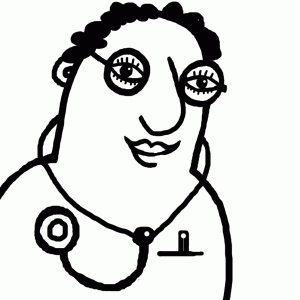You and your doctor
 A good relationship with your doctor and other health workers can really help.
A good relationship with your doctor and other health workers can really help.
Nurses and pharmacists can give you support and advice on all aspects of ART. This includes adherence and side effects.
They can make referrals. For example to dieticians, psychologists and social workers.
It is important to involve your local doctor (GP), especially as you get older. Find a GP and/or a surgery that you are happy with.
Your GP has expertise in other health areas and for other referrals.
Your rights as a patient
HIV testing, monitoring and treatment is free at any NHS HIV clinic to anyone living in the UK. This is even if you do not have permanent resident status.
Both you and the people involved in your care have certain rights and responsibilities. Some of these are listed below.
- To be fully involved in all decisions about your treatment and care.
- To be treated with respect and confidentiality.
- To have choices of drugs explained. This should include the risks and benefits of each drug.
- To have your doctor or nurse explain any test results.
- For your records to be kept securely. They should be made available for you to see if you ask.
- To choose whether to take part in research trials. This should not affect your current and future care.
- To be able to make a complaint about your treatment. Any complaint must be fully investigated. Again, this must not affect your future care.
- To have a second opinion from a suitably qualified doctor.
- If you write to your hospital or clinic, you should have a written response within 14-28 days.
- To change your doctor or treatment centre without it affecting your future care. You do not have to give a reason for changing doctor or clinic. But giving a reason might help resolve the problem and prevent it again in the future.
- To have test results and a summary of your treatment history forwarded to your new doctor or clinic.
I was confused about how my clinic worked, even when I was on treatment. One day I asked the nurse to explain the tests and what a ‘good’ or ‘bad’ result might mean.
It was tremendously helpful. I used to be happy with doctors saying ‘everything’s okay’ but now I want to know details about a few key things — my cholesterol, my bone health, my liver and kidneys.
— Matt, Brighton
Things you can do to help
- Find a clinic that is convenient to you and that you feel comfortable with.
- Find a doctor who you like. Woman may be able to ask for a female doctor.
- If you are a gay man and want to see a gay doctor, this might be available or might affect your choice of clinic.
- Turn up for your appointments on time. Tell the clinic if you can’t make it. Then they can give your slot to another patient.
- Make a list of things you want to discuss with your doctor. Remember to take it to your appointment!
- Ask to see the same doctor at each visit at least until you are settled with your care. This is important. It’s difficult to develop a good relationship if you always see a different doctor.
- Once you are more settled, one advantage of sometimes seeing a different doctor or specialist nurse is to get a second opinion and different perspective.
- Treat all people involved in your care with the same respect you would wish to receive yourself.
- Have your routine blood tests taken 2-3 weeks before your regular clinic visits so the results are ready for your appointment.
- Listen carefully to the health advice that you are given, and act upon it.
- If you don’t understand something, ask your doctor to explain it again or in a different way.
- Be open with those caring for you. Tell them about any other drugs that you are taking. This includes alcohol, legal and illegal drugs and complementary treatment.
- It is important to talk about your real level of adherence. If the people managing your care don’t know you are having problems, they can’t help.
- Remember that your HIV doctor may not be able to treat every health issue. Your GP and other specialists might be needed to get the best care.
Last updated: 1 June 2022.
